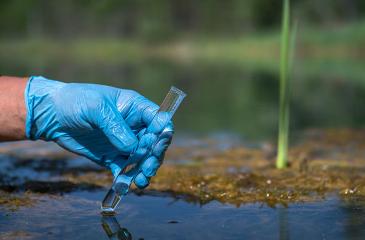A Sustainable Development Goal Project Supported by OACA
Wastewater treatment protects the environment and human health. Conventional wastewater treatment is energy-intensive and complex, making it impractical for rural and under-resourced communities.
“Low-tech” wastewater treatment technologies exist that can be leveraged globally for improved sanitation, such as wastewater treatment ponds, but unfortunately, the factors that control pond performance are poorly understood.

"Because the basis of operation for ponds is microbiological, studying the pond microbiome should allow us to determine the extent to which treatment performance is controlled by deterministic mechanisms, and within those factors under engineering control, which are the most important," said Paige J. Novak, P.E. (Minnesota), BCEE, who is leading the study on wastewater treatment.
Novak says such an approach is far easier than performing large-scale time- and space-intensive sampling campaigns, yet should yield similar information.
"We are so excited to have received an SDG Research Grant to support our work," said Novak, who is a professor & Joseph T. and Rose S. Ling Chair in Environmental Engineering, Department of Civil, Environmental, and Geo- Engineering. "It will help us advance understanding of a treatment process that could enable much broader successful deployment of sanitation while protecting surface water from excess nitrogen pollution."
The study team has already extracted DNA from pond samples and had them sequenced, and will start to analyze the sequences soon.



